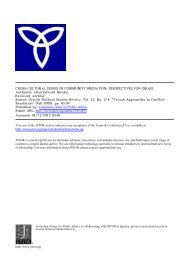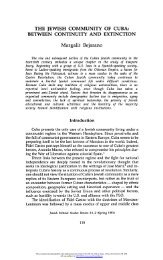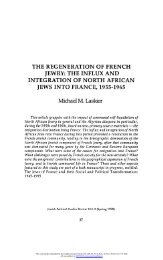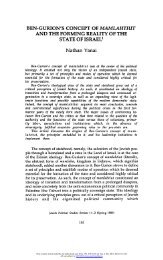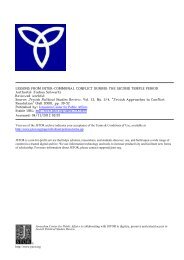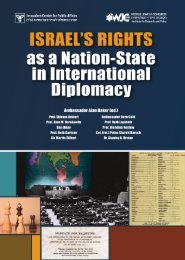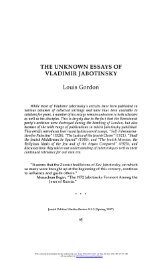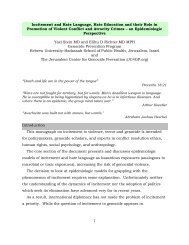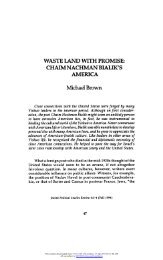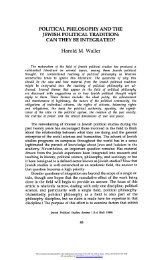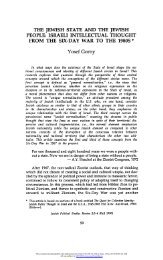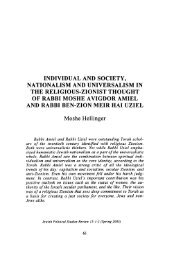Linking the Gaza Strip with the West Bank: - Jerusalem Center For ...
Linking the Gaza Strip with the West Bank: - Jerusalem Center For ...
Linking the Gaza Strip with the West Bank: - Jerusalem Center For ...
You also want an ePaper? Increase the reach of your titles
YUMPU automatically turns print PDFs into web optimized ePapers that Google loves.
It is important to note that a demand for selfdeterminationdoes not necessarily confer statehood. 101Self-determination can take various forms and, in<strong>the</strong> words of Judge Dillard, “it may be suggestedthat self-determination is satisfied by a free choice,not by a particular consequence of that choice or aparticular method of exercising it.” 102 The fact thatself-determination does not a fortiori confer a right tostatehood is made clear by Professor Malvina Halberstamwho stated, “[T]he establishment of an independent statefor each group seeking ‘self-determination’ may not be<strong>the</strong> best solution. The desirability of an independentstate depends on its economic, political, and militaryviability and on <strong>the</strong> effect its independence would haveon o<strong>the</strong>r states in <strong>the</strong> region.” 1033. Statehood as a Claim of Right?Is it necessary to expressly assert statehood, oralternatively, is statehood a factual circumstancerequiring no express assertions or actions? 104 If indeedstatehood requires an express assertion, <strong>the</strong>n sucha declaration would constitute an additional moderncriterion for statehood.Practically speaking, it would seem logical that beforebeing recognized as a state, an entity must assertstatehood. However, <strong>the</strong> mere fact that an entity claimsstatehood is not sufficient. All that such a claim willachieve is to invite an assessment by existing states asto whe<strong>the</strong>r <strong>the</strong> entity in question satisfies <strong>the</strong> criteriafor statehood. Thus, in <strong>the</strong> opinion of <strong>the</strong> authors, anassertion of statehood as a claim of right does notappear to be a criterion for statehood, despite <strong>the</strong> factthat it may be required practically.D. Recognition and StatehoodAs discussed by Professor Malcolm N. Shaw, <strong>the</strong>reis a complicated but significant relationship betweenrecognition and statehood. There are two <strong>the</strong>ories ofrecognition: <strong>the</strong> constitutive <strong>the</strong>ory and <strong>the</strong> declaratory<strong>the</strong>ory. The former asserts that recognition is constitutiveof a state, such that only through recognition does a statecome into existence. Thus, recognition can be crucialin <strong>the</strong> creation of a state. Conversely, <strong>the</strong> declaratory<strong>the</strong>ory asserts that recognition is not relevant to <strong>the</strong>existence of a state, since a state can be said to existonce <strong>the</strong> factual criteria for statehood are satisfied. 105Whichever view of recognition one chooses to adopt,<strong>the</strong>re is a significant inverse relationship betweenrecognition and <strong>the</strong> existence of an entity as a statefor <strong>the</strong> purposes of international law. The relationshipcan be explained as follows: <strong>the</strong> greater <strong>the</strong> degree ofinternational recognition that an entity enjoys, <strong>the</strong> lessmay be demanded in terms of adherence to <strong>the</strong> criteria ofstatehood. Conversely, <strong>the</strong> more sparse its internationalrecognition, <strong>the</strong> more stringently <strong>the</strong> entity will have tocomply <strong>with</strong> <strong>the</strong> criteria for statehood. If an entity iswidely recognized as a state, <strong>the</strong>refore, it will be subjectto a lesser burden of proof of <strong>the</strong> criteria for statehood.On <strong>the</strong> o<strong>the</strong>r hand, if very few states recognize an entity,<strong>the</strong>n it will be subject to a much greater burden of proof<strong>with</strong> respect to <strong>the</strong> criteria for statehood. 106Presumably, a futurePalestinian State wouldreceive overwhelminginternational recognition.This can be deduced fromseveral factors.The first is <strong>the</strong> fact that <strong>the</strong> PLO has been recognized byIsrael “as <strong>the</strong> representative of <strong>the</strong> Palestinian people”since 1993. 107 The second is that <strong>the</strong> PLO was grantedobserver status in <strong>the</strong> United Nations under UnitedNations General Assembly Resolution 3237 (XXIX) of1975. 108 The third factor is that, although premature,<strong>the</strong> Palestinian State declared in 1988 was givenwidespread international support receiving recognitionfrom 114 states 109 and being recognized by <strong>the</strong> UnitedNations General Assembly through <strong>the</strong> adoption ofResolution 43/177 (<strong>the</strong> Resolution was adopted by a voteof 104 in favor, <strong>the</strong> United States and Israel opposingand 36 states abstaining). 110 Moreover, today <strong>the</strong>re iswidespread international support for <strong>the</strong> creation of apage 19



